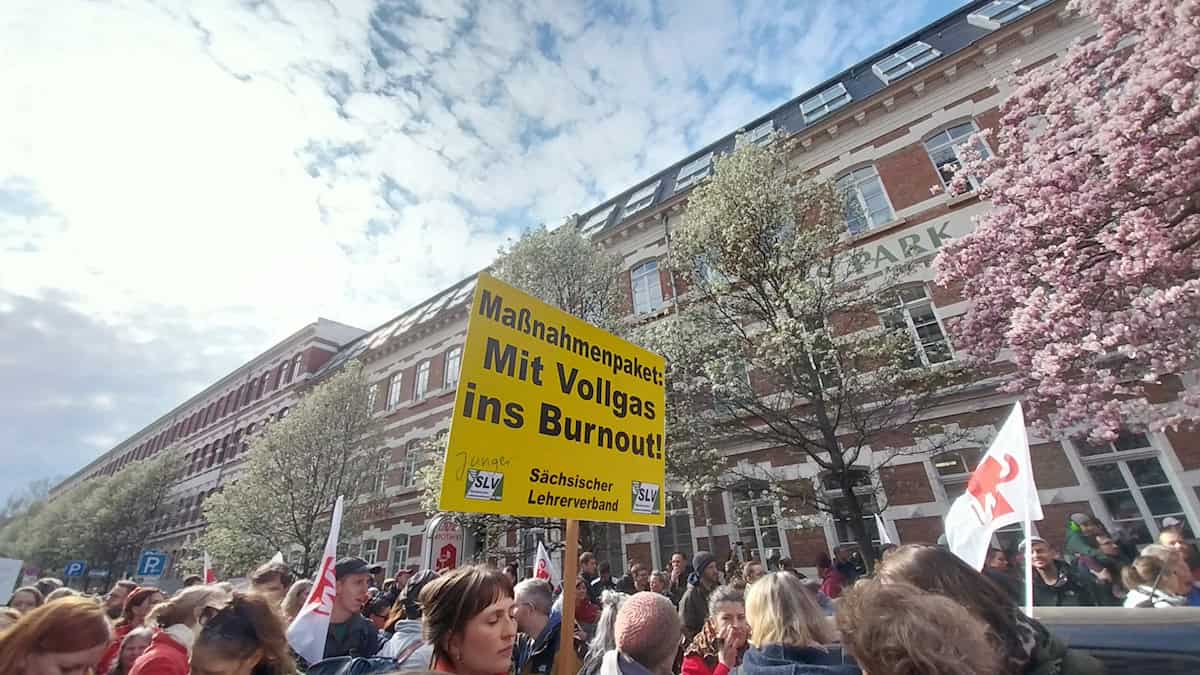The atmosphere on the forecourt of the Leipzig state education authority was tense this Tuesday afternoon. Around 1500 teachers have gathered with red outfits and placards to protest loudly against the measures of the Saxon Ministry of Education. With messages such as "Relief instead of stress", "Think first, then act, Mr. Minister!", "We want to shape, not burn out", "200 children, one pedagogical specialist, no punch line" or "Full throttle into burnout", they vent their displeasure. Loudspeakers play music by Herbert Grönemeyer, while red cards are held up from the crowd. For many of the teachers present, the planned reform is a huge burden and they do not feel heard.

Concerned teachers in front of the state education authority in Leipzig's Nonnenstraße / Source: Arne Frank
The protest is directed in particular against the plans of Education Minister Conrad Clemens. His proposals to reduce teaching absences, such as allowing teachers to work more flexibly at different types of schools and increasing their compulsory hours, have met with rejection. The impression that Clemens' visits to "100 schools in 100 days" are seen more as a PR campaign than a serious exchange is also vehemently held by Claudia Maaß, a teacher and official of the GEW trade union. She emphasizes that the current ideas are not a solution to the actual problems.

Minister of Education Conrad Clemens is the target of criticism / Source: Arne Frank
Criticism has also come from vocational school teacher Jens Nelle. He criticizes the fact that the commissioned teacher survey is being ignored by the school department, while new facts are being hastily created instead. Nelle is calling for more incentive systems to attract students to teacher training courses and a reduction in dropouts instead of further burdening teachers who are already employed.
Gesine Großert, a pupil and chairwoman of the Leipzig City Pupils' Council, is also joining the protest. She describes how important balanced teachers are for pupils' learning success. Persistent stress and frustration lead to an impersonal school day and make the situation worse.
Other protesters doubt the long-term goals of the project on education in Saxony by 2030. They consider the harmonization of the various reform approaches to be challenging and fear that this could affect the motivation and confidence of both teachers and pupils. There is enormous concern about the fairness of the new regulations and solidarity with older teachers in particular. In particular, the change to the teaching load for experienced teachers is being heavily criticized, as many of them feel that it is unfair.
The Saxon Ministry of Education and Cultural Affairs is planning to reduce the number of lost teaching hours through a package of measures. A central point is the additional work for teachers, in particular through changes to the so-called age reduction. Until now, teachers aged 58 and over have been able to work one hour less per week, two hours from the age of 60 and three hours from the age of 61. In future, this regulation will only apply from the age of 63 and will particularly affect teachers who were forced to teach part-time after the drop in the birth rate following reunification and were not made civil servants.
Further protests are planned for the coming days, including a large march in Chemnitz on Wednesday and an event in front of the Ministry of Education in Dresden on Thursday. Minister Clemens has announced that he will be there on Thursday. In addition, at the request of the Greens, a public hearing on the plans will take place on Friday in the state parliament's Committee on Schools and Education, whereby dthe state parliament cannot prevent the state government from amending the regulation on teachers' working hours, which is planned for the end of May, so that the changes would come into force in the coming school year.
Notwithstanding the discussions and hearings in the state parliament, the teachers remain ready to raise their voices and demand changes as long as nothing changes in the plans. Today, the time and place of the protest was probably also deliberately planned for the employees of the Landesschulbehörde in Leipzig. This is because Tuesdays are official visiting hours in Nonnenstraße from 1 p.m. to 6 p.m. and due to the demonstration outside, those who helped come up with the changes should also come into direct contact with the displeasure of the teachers and if there were any delays for the authority employees on their way back from work due to the road closures, this was not unintentional, as was heard on site.










